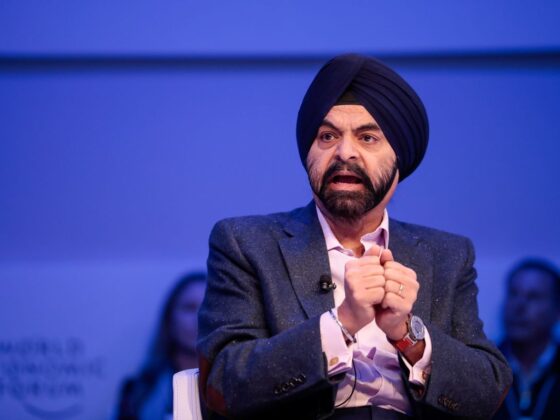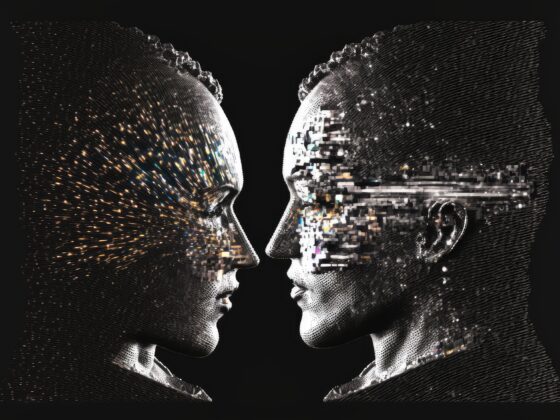In 2021, widespread implementation of COVID jab passport schemes in cities, states, and countries around the world not only pressured people into getting experimental drugs, they also also inured them to the experience of scanning their personal medical data to enter public spaces.
Under the auspices of “public health,” free people became accustomed to a “check-point” society in which liberty is purchased by conformity with the arbitrary mandates of the elites.
Now, even as many COVID jab passport schemes are being dropped amid widespread COVID fatigue, the World Economic Forum (WEF), international banks, and global technology companies are rapidly moving to develop global digital IDs building on the framework of COVID jab passports.
Such technology could make permanent the liberty-crushing controls imposed during the pandemic.
Thread: 🧵
1.
Big tech companies and governments are promoting the advent of a new Chinese / Indian style digital identity for everyone. The corona crisis has fast-tracked this digital ID agenda and many experts have warned ‘This is the end of freedom.’ pic.twitter.com/gxMLCn8ffs
— Sikh For Truth (@SikhForTruth) February 22, 2022
Vaccine passports have paved the way for global digital IDs
As early as April 2020, key players in the universal COVID vaccination narrative, including NIAID head Dr. Anthony Fauci and billionaire software developer Bill Gates, began to float digital identification as a means of exiting the COVID “crisis.”
After the roll-out of the experimental COVID-19 jabs in late 2020, leaders around the world moved to enact discriminatory COVID passport schemes which used digital credentials to segregate societies.
Fast forward to last month: German telecommunications company T-Systems (whose mobile subsidiaries go by the name T-Mobile), announced it had partnered with the WEF to create “electronic vaccination certificates” with QR codes that can “be checked across national borders.”
At the same time, the president and CEO of the Canadian Bankers Association announced that “Canada’s banks are perfectly situated to help lead the creation of a federated digital ID system between government and the private sector.”
“Canada’s banks are perfectly situated to help lead the creation of a federated digital ID system between government and the private sector.
The World Economic Forum agrees.”
~ Neil Parmenter
President & CEO
Canadian Bankers Association
pic.twitter.com/VT8PA14sjH— Cecil Charles (@thececilcharles) February 23, 2022
The developments have led commentators and experts to warn that technology used to develop COVID vaccine passport platforms won’t vanish as the COVID hysteria dwindles.
Instead, the vaccine verification technology can easily be adapted to track and score compliance with a vast range of government mandates and priorities above and beyond vaccination status, penalizing the noncompliant by easily freezing bank accounts, banning travel, and blocking access to public venues at the click of a button.
“While it may begin with only carrying digital information regarding whether an individual is vaccinated, the rest of the functionality of the Chinese Social Credit System can be integrated into the ‘Vaccine Passport’ system in a matter of minutes or hours,” explained China expert Reggie Littlejohn, co-founder of StopVaxPassports.org.
In a March 2 radio broadcast, conservative commentator Glenn Beck pointed out that “a digital ID system that would collect personal data about your online behavior, purchase history, network usage, medical history, travel history, energy uses, health stats” and more, using the information “to determine who should open bank accounts, conduct financial transactions, access insurance & treatment, book trips,” and even “cross borders.”
The warnings are not far-fetched.
Advocates have not hesitated to affirm the link between COVID jab passports and global digital IDs.
In a comprehensive Twitter thread outlining the shift toward centralized digital IDs, “Sikh for Truth,” a writer and editor for TruthTalk.uk, pointed out that the digital ID advocacy group ID2020, founded in 2016 in part by Gavi, the Rockefeller Foundation, and Microsoft, had connected the dots between widespread vaccination and digital ID platforms long before the COVID-19 pandemic.
In 2018, the nongovernmental organization suggested that “Vaccination offers a great opportunity to give children a sustainable, portable and secure digital identity early in life.”
Now, over 125 companies, including ID2020, MasterCard, Airlines for America, and IBM, have joined the Good Health Pass Collaborative to create a global COVID passport.
Armand Arton, founder of the Global Citizen Forum, noted that just as people rolled up their sleeves for experimental new injections, they may also be “more susceptible” to digital IDs in the wake of COVID-19.
Likewise Andrew Bud, founder and CEO of Iproov, a London-based company that sells facial recognition technology and developed the British COVID app, told Forbes last month, “The evolution of vaccine certificates will actually drive the whole field of Digital ID in the future.”
Last year, Bud told Business Leader that “once adopted for COVID,” digital credentialing systems “will be rapidly used for everything else.”
There are signs digital IDs are fast becoming the norm.
The European Union has already begun implementation of a digital ID wallet to store biometric data like facial recognition and fingerprints, while acting as the gateway to a wide range of services like opening a bank account, applying to a university, renting a car, and checking into a hotel.
Digital IDs could be the first step toward a global social credit system
Many people are already familiar with the Social Credit System utilized by the Chinese Communist Party, which uses digital ID technology to rank citizens’ “trustworthiness” according to the government using a range of factors including purchasing habits and social media interaction.
The system, still in its infant stages, is designed to reward behavior approved of by the communist superstate and punish dissidents by withholding or awarding freedoms.
But China’s not alone in collecting personal data in digital identification systems.
India has also had an extensive electronic ID system since 2009. Utilized by over a million people throughout the country, the digital ID platform logs demographic and biometric data and is linked to a payment system operated by Mastercard.
In Nigeria, a digital ID program which became mandatory to “open a bank account, apply for a driving licence, to vote and submit tax returns,” gave rise to serious privacy concerns, according to a report by Reuters last summer.
Meanwhile, the concept of comprehensive top-down digital ID with broad surveillance capabilities and an incentive structure to apply social controls had also been explored in an episode of the science fiction show Black Mirror.
The episode, entitled “Nosedive,” depicted a westernized version of China’s social credit system, in which failure to conform to arbitrary standards could swiftly cut individuals off from freedoms, privileges, social interactions, and even basic necessities.
But the idea isn’t isolated to foreign nations or science fiction TV shows.
ESG scores: From corporate ranking score to personal rating
A system of unified numerical scores for gauging political, environmental, and social conformity is actually already in place in the United States.
Known as Environmental, Social, and Governance (ESG) scores, the ranking system has become firmly entrenched among American corporations, tracking a company’s carbon footprint, political alignment, the racial and sexual “diversity” of its staff, and more.
In February, The Impact Investor noted that “stakeholders pay attention to the effect a company has on the environment,” while “third parties and even the government” are “also keeping track.”
World financial leaders have already called for “globally consistent” standards for recording and reporting ESG scores.
And ESGs aren’t limited to corporations.
According to The Impact Investor, personal ESG scores are already in the works, and are set to take in a full range of personal data points up to and including personal beliefs.
“Buying a gun, alcohol, or even clothing will all affect your overall ESG score,” the blog noted, adding, “Not only will your purchases matter, but who you purchase from and how they do business.”
“Your political affiliations also factor into your personal ESG score,” the resource continued. “The type of car you drive, how often, and even how many people are in the car when you drive will also come into play when deciding your score.”
Hope you’re paying attention. pic.twitter.com/r44RKY38hY
— James Lindsay, wants to liberate Canada (@ConceptualJames) February 9, 2022
Meanwhile, “unlike credit scores with a clear method of tabulation, cause, and effect, ESG scores depend on a wide variety of factors that most people have yet to consider,” the blog post noted, adding that “Depending on where you live, even calculating a personal ESG score can mean giving up your rights to basic privacy.”
A combination of vaccine passport tech and ideological ranking could spell the end of freedom in the West
It’s not difficult to see how a powerful centralized digital platform combined with a comprehensive rating system like a personal ESG score could create a modern slave class bound to obey the dictates of government and corporate elites.
A global digital ID could make permanent the kind of “two-tier” society previewed during the COVID-19 pandemic, introducing free western countries into a new caste system whereby those who conform to the values and mandates of those in power belong to a separate and privileged class, while those who do not are shunned and blacklisted.
The Canadian government’s militaristic crackdown on the Ottawa Freedom Convoy last month, whereby the bank accounts of protestors and supporters were frozen without due process, gives a disturbing glimpse into the ability of governments to easily destroy the lives of dissenters without the costly necessity of arrest or imprisonment.
Furthermore, in an increasingly cashless society, with all important data, information, controls, and permissions stored on smartphones, a centralized digital ID could afford totalitarian governments the ability to reorder society according to their whims, able to shut down opponents and seize the assets with the click of a button.
The fight isn’t over: don’t lose sight of what matters
As leaders around the world respond to increasing pressure from brave citizen groups by dropping coercive COVID mandates and restrictions, it’s important to keep our eyes on the shell game.
Don’t let Democrat leaders, U.N. elites, and WEF lackeys drop local vaccine passports only to replace them with global digital IDs, effectuating a more permanent and widespread obliteration of personal autonomy, national borders, and essential freedom.
Don’t trade your freedom for convenience. As trucker convoys and other massive protests around the world have rallied the world for liberty, turning public opinion toward the defense of God-given rights and freedoms, let’s make sure we don’t win the small battle against COVID mandates but lose the larger war against an emerging surveillance state.
Personal autonomy, along with the freedom to believe, to worship, to speak, and to disagree, are essential. We must fight to defend them.
Ashley Sadler is a California-based journalist for LifeSiteNews. She has a deep love of American history and the Traditional Latin Mass. In her free time she enjoys mountain-biking, taking road trips, and reading classic literature. You can follow on her on Twitter @asadler216













